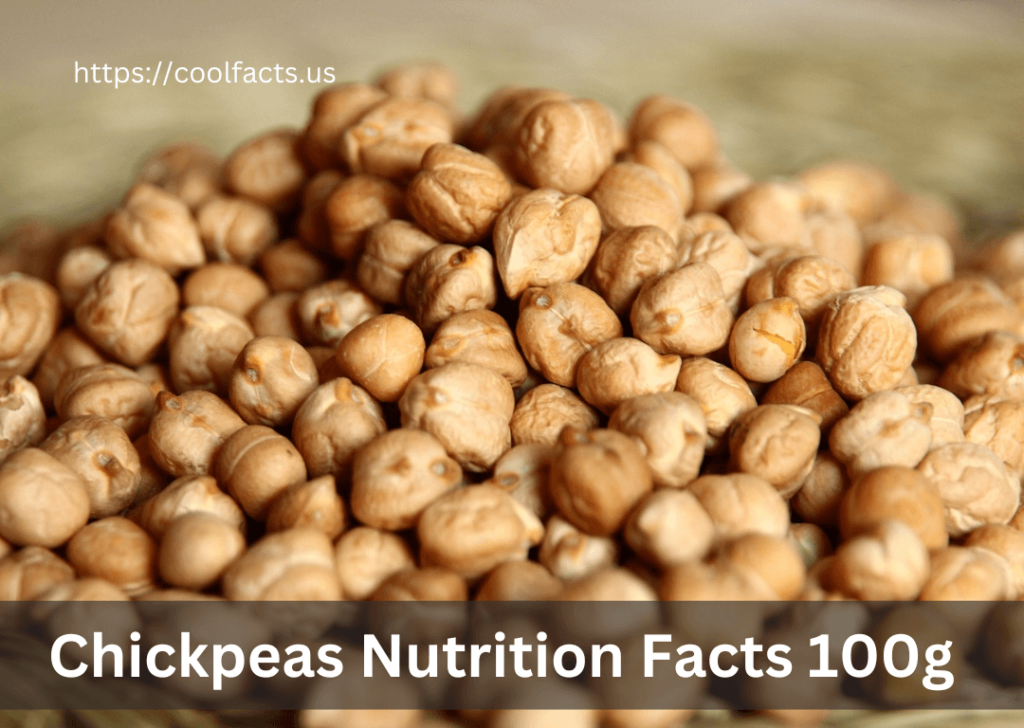Chickpeas, also known as garbanzo beans, are not only a staple in various cuisines around the globe but also pack a powerful punch when it comes to nutrition. Whether you’re a health enthusiast or simply looking to diversify your diet, understanding the nutritional profile of chickpeas is essential. In this guide, we delve into the chickpeas nutrition facts per 100g to unveil their remarkable health benefits.

What Makes Chickpeas Nutritious?
Protein Powerhouse
One of the most noteworthy aspects of chickpeas is their high protein content. In just 100g of cooked chickpeas, you can find approximately 8.9g of protein. This makes chickpeas an excellent plant-based protein source, particularly for individuals following a vegetarian or vegan diet. Protein is essential for muscle repair, growth, and overall body maintenance, making chickpeas a valuable addition to any diet plan.
Rich in Dietary Fiber
Chickpeas are also packed with dietary fiber, with 6g per 100g serving. Fiber plays a crucial role in digestive health by promoting regular bowel movements and preventing constipation. Additionally, fiber helps regulate blood sugar levels, aids in weight management by promoting satiety, and supports heart health by lowering cholesterol levels. Including chickpeas in your meals can help you meet your daily fiber requirements and reap these health benefits.
Abundance of Essential Nutrients
In addition to protein and fiber, chickpeas are rich in essential nutrients that are vital for overall health and well-being. These include:
- Vitamins: Chickpeas contain various vitamins, including vitamin K, folate, vitamin B6, and vitamin C. These vitamins play key roles in energy metabolism, immune function, and cell growth and repair.
- Minerals: Chickpeas are a good source of minerals such as iron, phosphorus, magnesium, and zinc. These minerals are involved in numerous physiological processes, including oxygen transport, bone health, and immune function.
Health Benefits of Chickpeas
Supports Heart Health
The combination of fiber, protein, and essential nutrients in chickpeas makes them beneficial for heart health. Fiber helps lower cholesterol levels, while protein can aid in reducing blood pressure. Additionally, chickpeas contain potassium, which is known to regulate blood pressure and support cardiovascular function. Including chickpeas in your diet may help reduce the risk of heart disease and improve overall heart health.
Aids in Weight Management
Due to their high fiber and protein content, chickpeas can help promote feelings of fullness and satiety. This can prevent overeating and aid in weight management efforts. Incorporating chickpeas into meals can help you control portion sizes, reduce calorie intake, and support your weight loss or maintenance goals.
Regulates Blood Sugar Levels
The fiber content in chickpeas slows down the absorption of sugar into the bloodstream, which helps regulate blood sugar levels. This can be particularly beneficial for individuals with diabetes or those at risk of developing the condition. By including chickpeas in balanced meals, you can help stabilize blood sugar levels and improve overall glycemic control.
How to Incorporate Chickpeas into Your Diet
Now that you’re aware of the nutritional benefits of chickpeas, you may be wondering how to incorporate them into your diet. Here are some delicious and nutritious ways to enjoy chickpeas:
- Hummus: Whip up a batch of homemade hummus using chickpeas, tahini, garlic, lemon juice, and olive oil. Enjoy it as a dip for fresh vegetables or spread it on whole grain toast.
- Chickpea Salad: Toss cooked chickpeas with chopped vegetables, herbs, and a light vinaigrette dressing for a refreshing and satisfying salad.
- Chickpea Curry: Prepare a flavorful chickpea curry using spices, tomatoes, coconut milk, and chickpeas. Serve it with rice or naan bread for a hearty meal.
- Roasted Chickpeas: Coat chickpeas in olive oil and your favourite seasonings, then roast them in the oven until crispy. Enjoy them as a crunchy snack or as a topping for salads and soups.
Conclusion
In conclusion, chickpeas are a nutritional powerhouse packed with protein, fiber, vitamins, and minerals. Incorporating chickpeas into your diet can offer a wide range of health benefits, including support for heart health, weight management, and blood sugar regulation. Whether you enjoy them in salads, soups, curries, or dips, adding chickpeas to your meals is a delicious and nutritious way to boost your overall well-being. So why not grab a can of chickpeas and start exploring the endless culinary possibilities today?